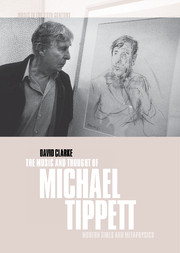Book contents
- Frontmatter
- Contents
- Acknowledgements
- References to Tippett's scores and essays
- 1 Tippett and the ‘world vision’ of modernity
- 2 The significance of the concept ‘image’ in Tippett's musical thought: a perspective from Jung
- 3 Back to Nietzsche? Transformations of the Dionysiac in The Midsummer Marriage and King Priam
- 4 Metaphysics in a cold climate: The Vision of Saint Augustine
- 5 ‘Shall we …? Affirm!’ The ironic and the sublime in The Mask of Time
- 6 The meaning of ‘lateness’: mediations of work, self and society in Tippett's Triple Concerto
- 7 The golden bird and the porcelain bowl: Byzantium and the politics of artefacts
- Notes
- Bibliography
- Index
5 - ‘Shall we …? Affirm!’ The ironic and the sublime in The Mask of Time
Published online by Cambridge University Press: 13 October 2009
- Frontmatter
- Contents
- Acknowledgements
- References to Tippett's scores and essays
- 1 Tippett and the ‘world vision’ of modernity
- 2 The significance of the concept ‘image’ in Tippett's musical thought: a perspective from Jung
- 3 Back to Nietzsche? Transformations of the Dionysiac in The Midsummer Marriage and King Priam
- 4 Metaphysics in a cold climate: The Vision of Saint Augustine
- 5 ‘Shall we …? Affirm!’ The ironic and the sublime in The Mask of Time
- 6 The meaning of ‘lateness’: mediations of work, self and society in Tippett's Triple Concerto
- 7 The golden bird and the porcelain bowl: Byzantium and the politics of artefacts
- Notes
- Bibliography
- Index
Summary
The sublime and the ridiculous
Of all Tippett's works The Mask of Time (1980–2) seems to have provoked the most polarized critical reception. This is not just a matter of quibbling over nuances. When one commentator esteems the piece for its ‘extraordinarily heterogeneous coherence’ while another assigns it to the category of ‘eclectic lead balloons’; when summary evaluations have rated it on the one hand as ‘the climax and crown of Tippett's output’ and on the other as ‘an almost complete disaster on aesthetic grounds’, we may surmise instability as something essential to its makeup – an objective property, perhaps, to which the cleavage in the pattern of subjective judgement may not be unrelated.
One source of that instability could be the disparity between the grandeur of the work's ambition and the means the composer uses to realize it. ‘The Mask of Time’, he declares,
is explicitly concerned with the transcendental. It deals with those fundamental matters that bear on man, his relationship with Time, his place in the world as we know it and in the mysterious universe at large. But it subscribes to no particular liturgy or standard theory, Biblical or otherwise, about the creation of the world and the creation of mankind.
‘Inescapably’, then, Tippett
had to accommodate a plurality of co-existing viewpoints. At best, [the] composition offers fragments or scenes from a possible ‘epiphany’ for today. The forces used in each scene or fragment are heterogeneous: hence [the] description ‘for voices and instruments’.
- Type
- Chapter
- Information
- The Music and Thought of Michael TippettModern Times and Metaphysics, pp. 147 - 205Publisher: Cambridge University PressPrint publication year: 2001

